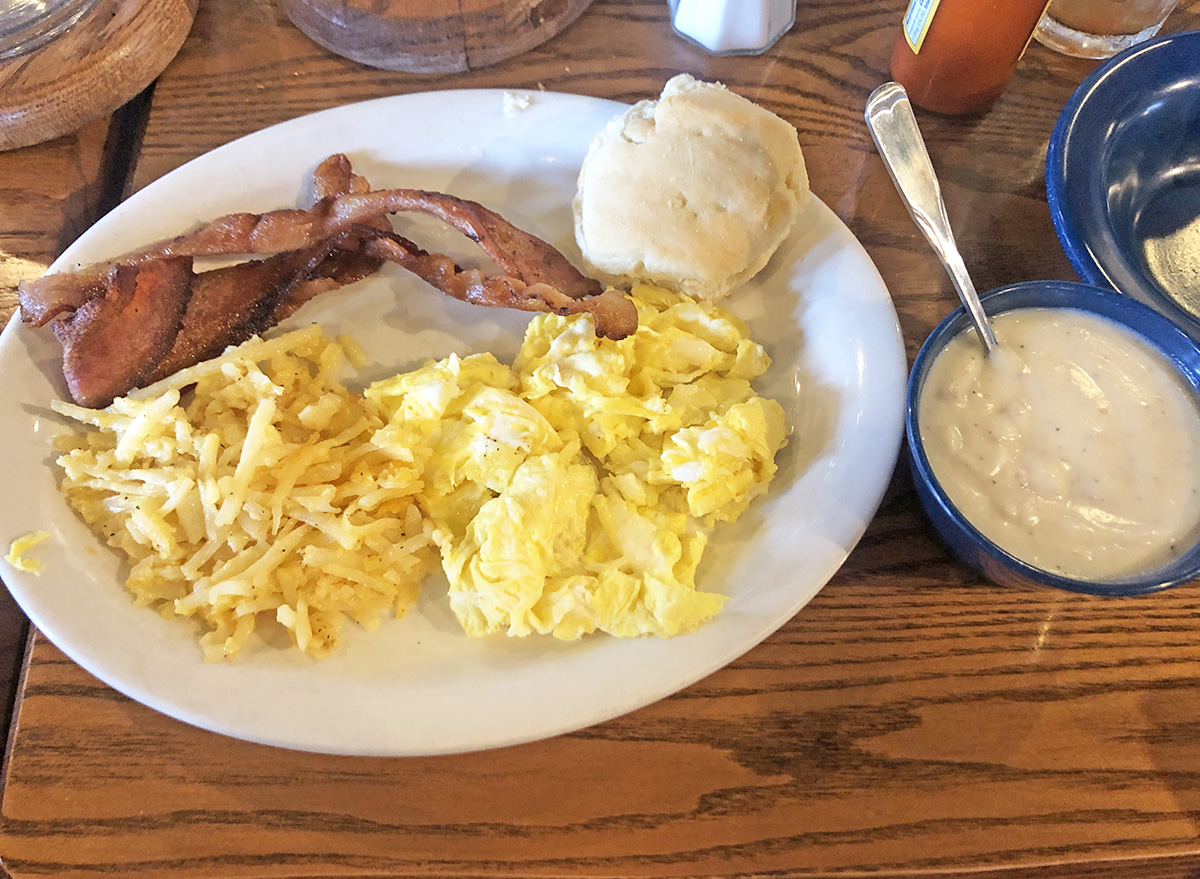What Happens to Your Body When You Skip Breakfast

Growing up, your parents likely told you ad nauseam that breakfast is the “most important meal of the day.” Well, they may have been right all along. Studies show that eating a healthy breakfast is related to a higher intake of nutrients throughout the day and better overall diet quality. The unfortunate news though is not everyone has the time for breakfast. Also, many folks prefer fasting in the morning and having their first meal later in the day. But what happens to your body when you skip breakfast? To find out, we chatted with registered dietitians who share their expert wisdom on the potential health consequences of not breaking your fast in the morning.
Eating a healthy, balanced breakfast in the morning can do amazing things for your health. That’s because breakfast is more than a meal; it’s a catalyst that kickstarts your metabolism and fuels a healthy body and mind. A 2018 study in Nutrients concluded that those who eat breakfast consume fewer added sugars and more fiber, vitamins, and minerals than non-consumers.
So if skipping breakfast makes you miss out on important nutrients, what other side effects could be happening without you knowing? Regardless of where you stand on breakfast, it’s essential to understand the potential drawbacks skipping breakfast has on your body.
Read on to learn more, and then for some breakfast inspiration, check out these 38 High-Protein Breakfasts That Keep You Full.
Your blood sugar may drop.

Without the intake of nutrients from a healthy, well-balanced breakfast, your blood sugar levels may dip, leaving you tired, irritable, and unable to focus. According to a 2019 study, those who skipped breakfast experienced increased blood sugar levels and poorer blood sugar control.
“Since you’re fasting all night while sleeping, your blood sugar is already naturally dipping [after waking],” says Caroline Young, RD, a registered dietitian and owner of Whole Self Nutrition. “If you don’t bring it back up by eating a well-balanced breakfast, your blood sugar will continue to drop throughout the morning. Over time, this can lead to large blood sugar swings and instability, which, of course, can lead to prediabetes or diabetes. Research shows breakfast skipping is linked to increased type 2 diabetes risk.”
You may struggle to focus.

Breakfast delivers essential nutrients that fuel your brain for a day of focused work. Skipping this nutritional foundation may lead to difficulty concentrating and a foggy mental state. A 2017 study observed that participants who skipped or ate an unhealthy breakfast had poorer cognitive performance throughout the day than healthy breakfast eaters.
Trista Best, RD, a registered dietitian with Balance One Supplements, tells ETNT, “Breakfast provides the body and brain with essential nutrients and energy after a night of fasting. For some individuals, skipping breakfast may lead to decreased cognitive performance, including difficulties with concentration, memory, and problem-solving. This can be particularly noticeable in the morning when mental demands are high.”
Your metabolism may slow down.

Skipping breakfast when your body is conditioned to receiving calories in the morning can have a counterproductive effect on your metabolism. Studies suggest your body may adjust by slowing down its metabolic rate, potentially resulting in weight gain.
“Regular meals, including breakfast, play a role in maintaining a balanced metabolism,” Best explains. “Skipping breakfast may disrupt this balance, potentially affecting the body’s ability to use efficiently and store energy.”
Your hunger cues may go haywire.

What may start as a conscious choice to forgo your morning meal can trigger intense cravings later in the day, leading to potential overeating and making it challenging to maintain a balanced and mindful approach to food.
“Your body seeks equilibrium, so skipping breakfast may lead to more cravings or binging later in the day as your body tries to make up for the missing calories,” says Sarah Schlichter, MPH, RDN, a registered dietitian at Bucket List Tummy. “A study found that breakfast skippers consumed more carbohydrates (including added sugars), total sugars, and total fats than those who ate breakfast.”
Your cortisol levels can increase.

The stress hormone cortisol doesn’t respond only to emotional stress; it also reacts to the physiological stress induced by skipping meals. According to a 2021 systematic review in Nutrients, skipping breakfast may spike morning cortisol levels, potentially leading to increased appetite and poor sleep quality.
“Any form of food restriction, including skipping breakfast, is a form of mental and bodily stress,” states Young. “For your nervous system to be regulated, it needs adequate nourishment. So, when you skip breakfast, your body is more likely to go into a dysregulated state, such as fight-or-flight, which comes with anxiety, elevated heart rate, and irritability.”
Your energy levels may drop.

Breakfast delivers the fuel your body needs to kickstart its metabolic processes and have the necessary energy for daily activities. When you skip breakfast, your blood sugar levels may plummet, leaving you fatigued, lethargic, and irritable. According to a 2021 study, breakfast skipping is linked to increased fatigue and reduced sleep quality.
“Since eating is what gives us literal energy (calories break down into ATP), continuing your fast from overnight by not eating breakfast may lead to extra fatigue, fogginess, headaches, mood swings, and poor cognitive performance,” says Schlichter.
- Source: [Importance of breakfast in the nutritional and health improvement of the population]
- Source: Breakfast in Human Nutrition: The International Breakfast Research Initiative
- Source: Meal timing, meal frequency, and breakfast skipping in adult individuals with type 1 diabetes – associations with glycaemic control
- Source: Breakfast Skipping Is Associated with Increased Risk of Type 2 Diabetes among Adults: A Systematic Review and Meta-Analysis of Prospective Cohort Studies
- Source: The effects of breakfast on short-term cognitive function among Chinese white-collar workers: protocol for a three-phase crossover study
- Source: The Association between Breakfast Skipping and Body Weight, Nutrient Intake, and Metabolic Measures among Participants with Metabolic Syndrome
- Source: Skipping Breakfast Is Associated with Diet Quality and the Distribution of Food Intake Throughout the Day: NHANES 2005–20016
- Source: The Window Matters: A Systematic Review of Time Restricted Eating Strategies in Relation to Cortisol and Melatonin Secretion
- Source: Skipping breakfast and mood: The role of sleep









